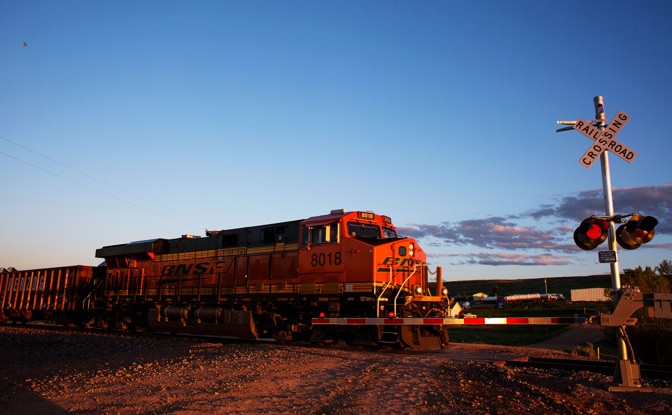She added that it had been “nearly twenty years” since the association was a member of “the majority of the organizations” that Triedman was referring to.
The scope of the railroads’s role surprised even experts, says Geoffrey Supran, a Harvard researcher of global-warming politics, who was not involved in the new analysis.
It’s now clear that railroads were “central” to the effort to deny climate science and delay policy, he told me. “They’re not peripheral. These are key cogs in a multidecade, well-oiled, well-funded denial machine. This is a big deal.”
By the beginning of the 1990s, much of today’s climate science was already clear to researchers.
In the first year of that decade, the new Intergovernmental Panel on Climate Change—in its first-ever report—warned that “human-caused emissions of carbon dioxide” were disturbing the climate. If humanity failed to slow and stop this pollution, global average temperatures could, by 2025, rise by 1 degree Celsius. (This prediction turned out to be too optimistic.)
The rail industry’s first strike against this consensus came in 1991, when its trade group—the Association of American Railroads—joined the Coalition for Vehicle Choice, an early consortium of automakers and their allies that opposed increasing federal gas-mileage standards. That group called concerns about climate change “ridiculous and dangerous.”
The following year, the rail association joined the now defunct Global Climate Coalition, or GCC, the broadest and most powerful of the denial front groups in the 1990s—“the very heart of the denial machine,” as Supran called it.
In 1995, when the IPCC released its second report, it found that the evidence suggested a “discernible human influence” on the climate. The GCC pounced. It attacked Benjamin Santer, one of the report’s lead American authors, falsely accusing him of misleading the public by concealing scientific uncertainty. In fact, the IPCC report spent considerable space discussing and quantifying scientific uncertainty. The GCC also said the panel was guilty of “institutionalized ‘scientific cleansing.’” This was a “disgusting and not-so-subtle reference,” Supran said, to “ethnic cleansing,” the euphemism for genocide used in the Bosnian War a few years earlier.
The Association of American Railroads helped lead the GCC through this period. Richard Briggs, then the executive vice president of the rail association, was the GCC’s chairman in 1995, and Edwin Harper, the rail association’s president, was GCC’s secretary in 1996, according to IRS documents. All four of the big railroads were themselves members of the GCC in one or both of those years.
In 1997, the GCC spent more than $13 million on ads opposing the Kyoto Protocol, an international climate treaty. When President George W. Bush formally withdrew from Kyoto in 2001, a senior State Department official told GCC that it had changed history: Bush “rejected Kyoto, in part, based on input from you,” she wrote in a memo.
During this period, the railroads joined other groups opposed to climate science and policy, many of which had a specifically pro-coal bent.
Source link
 Black America Breaking News for the African American Community
Black America Breaking News for the African American Community
